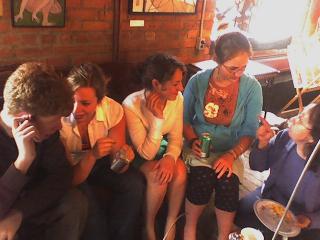Youth Advising Is a Big Job, but Somebody’s Got to Do It!
[Editors’ note: The UUA Office of Youth and Young Adult Ministries, in collaboration with a number of UUA regional teams, has published eight Youth Advising Competencies as an optional tool to help Congregational Life field staff, religious professionals, lay leaders, and advising teams identify excellence and assess needs for growth among the people trusted to advise Unitarian Universalist youth.]
By Jennica Davis-Hockett
When I first became an advisor, I certainly didn’t know what I was getting into! I thought being a youth advisor meant hanging with teens and helping them plan a summer service trip. I didn’t realize it could also mean helping youth understand and practice the complexities of covenantal community, being present with youth as they come out as gay, lesbian, bisexual, or transgender, processing trauma, or dealing with addiction. Nor did I understand that I needed to be finding my own spiritual community outside youth ministry, deepening my UU theology, and becoming more effective and organized in my communications with parents, teammates and supervisors.
I remember walking home from youth group on multiple occasions with the anxious question “Am I doing this right?” circling in my head. I tried to seek counsel from my supervisor. I did some self-educating and plenty of soul searching to figure out how I could grow into my ministry. Advising youth is an important ministry, and I didn’t want to mess it up.
My religious educator and I did the best we could to synthesize all the information out there for youth advisor development, but it was A LOT! She was new in her position, just like me. I can only imagine from her perspective what it must have been like to figure out how to support me in my growth as an advisor.
Whether you are a youth advisor, a religious educator, a minister, music director, lay leader, or member of the UUA’s Congregational Life staff, at some point in your ministry you, too, may have asked yourself “How are we doing with this whole youth ministry advising thing?”
This is where the Youth Advising Competencies come in. We’ve identified eight vital areas of growth for people who advise and minister to UU youth. The growth areas are mapped out broadly, so they will be useful within the parameters of how your region, district, and congregation do youth ministry. They have been cross-referenced with the Web of Youth Ministry, the Youth Ministry Renaissance Module and A Complete Guide to Youth Ministry Advising to ensure they reflect the larger vision and established best practices of youth ministry advising in Unitarian Universalism.
- UUA field staff can use this compilation of advising competencies to support religious educators in building a breadth and depth of competence for healthy, safe congregational youth ministry.
- Religious educators can use these competencies as a guideline for healthy best practices in hiring advisors and evaluating existing advising teams. We know religious educators aspire to hire the best advisors for their youth. This tool can help religious educators hire and mentor the right adults.
- Youth advising teams can use the list of competencies to self-assess ways they complement one another and areas in which they can grow. Evaluation matrices for advisors and their supervisors will help assess strengths and improvements in the competencies UU youth need advisors to have.
We’ve created three categories for each competency: entry level (critical for an advisor to have on day one), basic (competencies which form the foundation of a healthy youth ministry), and advanced (appropriate for long-term advisors, paid staff, and other highly committed adults). Each category comes with an evaluation tool so advising teams and religious educators can identify areas for growth.
Vital youth ministry and resilient Unitarian Universalist youth begin with healthy, spiritually mature adults. Advising is an important ministry, one that adults might not know what they’re getting into when they sign up. My hope is that, if you choose to use it, this tool can provide some insight into the question we all ask ourselves at times, “How are we doing with this whole youth ministry thing?”
Next Steps!
To explore using the Youth Advisor Competencies in your UU faith community, join Jennica Davis-Hockett and the UUA Faith Development Office (FDO) for a free, one-hour webinar either Tuesday, May 19 (1 pm Eastern) or Wednesday, May 20 (9 pm Eastern). Register for a webinar here. See more FDO webinars here.
View the new Youth Advisor Compencies on the Youth Advisor page of the UUA website! You may also be interested in the Youth Ministry Advising: A Complete Guide, a comprehensive resource for UU youth programs, available from the UUA Bookstore.
The UUA sponsors an email list for youth advisors. Members ask one another questions and share best practices about working with youth. Contact the UUA to subscribe to this email group.
About the Author
Jennica Davis-Hockett, Leadership Development Associate in the UUA Office of Youth and Young Adult Ministries, began her ministry with youth in 2008 at First Unitarian Church of Salt Lake City, Utah, her hometown. Since then she has served as District Youth Ministry Consultant (Mountain Desert) and Regional Youth Ministry Specialist (Pacific Western). Her vision for youth ministry is that every Unitarian Universalist youth has a dependable support network that acknowledges their inherent worth and dignity and fosters their potential as a spiritual leader, and that every UU adult in that network has the wisdom, compassion, and support to meet that call. Her spiritual practices include gardening, yoga, rock climbing, playing the ukulele, and nature adventures in the Utah wilderness with her husband Mat.

